Under Armour Diversity Series – Running Proud with Gabriel Jarquin
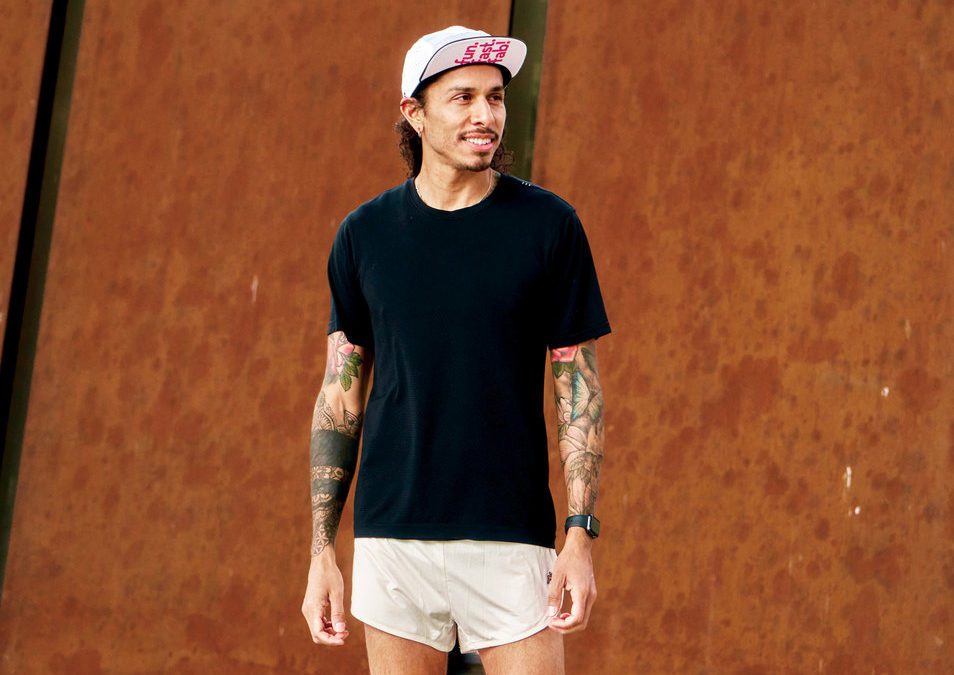 Photo by:
Andre Morgan
Photo by:
Andre Morgan
Growing up in Kitchener, Ont., as the son of refugees from Nicaragua, Gabriel Jarquin took comfort in running from a young age. Now he’s using it to support others in the struggle for self-acceptance
Under Armour has teamed up with Canadian Running to produce the Under Armour Diversity Series — an exclusive feature content series designed to highlight and promote individuals and organizations that have demonstrated a commitment to grow the sport of running, support those who are underrepresented and help others. Over the next six months, the series will feature stories and podcasts highlighting these extraordinary Canadians making a difference in their communities and on the national running scene.
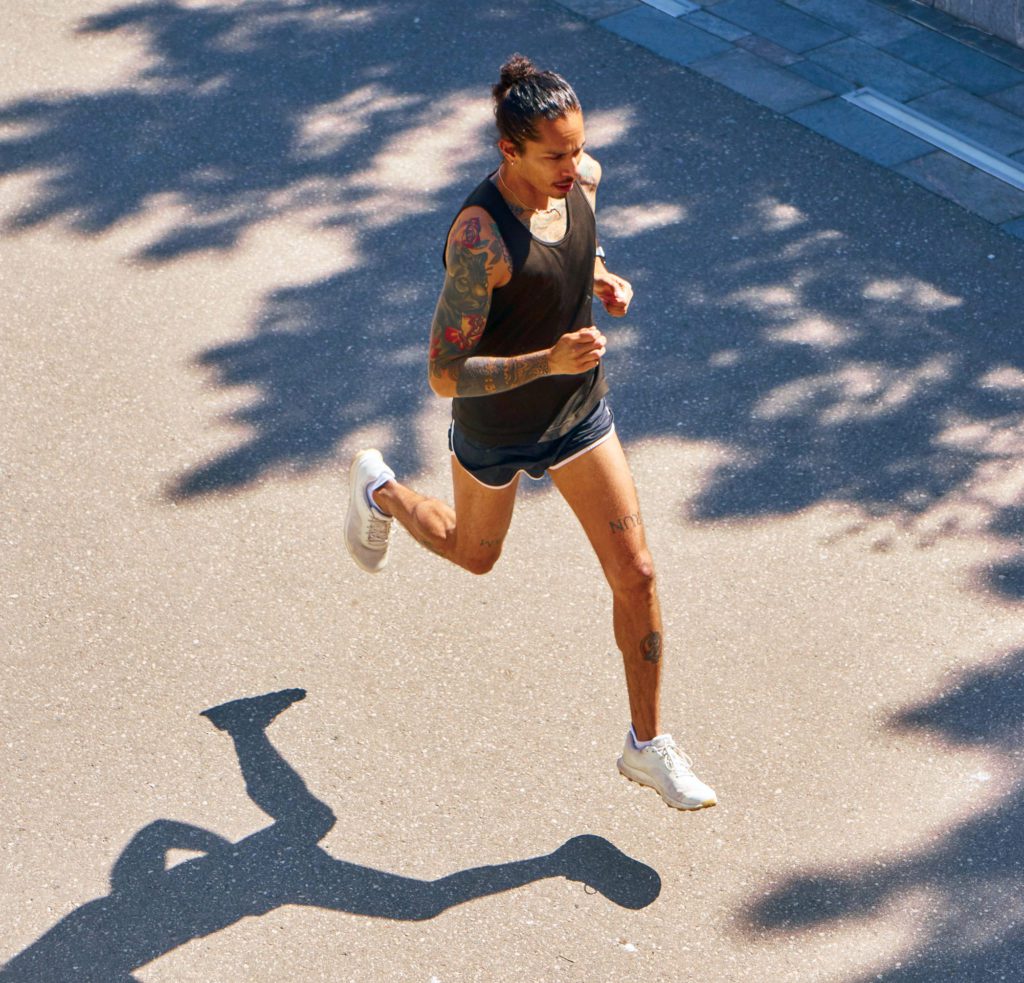
Gabriel Jarquin is in love. The 36-year-old flight attendant and 1:10 half-marathoner met his partner, Ian, in March 2020, as the world began to shutter with the spread of covid-19. One year and four months later, they’re moving in together. “I never thought I would be in a place where I was in love – or rather, allowing myself to be loved,” Jarquin says. “I’m starting a life with someone, and I constantly have to remind myself to be present and remember how I got here.”
Finding a relationship is just one of the ways things are looking up for Jarquin: he’s running better than ever, and his new role as experience director for Toronto’s Pride and Remembrance Run is seeing him give back in a significant way, both to the sport and to the LGBTQ community, which taught him the most important kind of love: self-love.
In school, Jarquin loved running, and he excelled at it. It also served as an escape from the bullying he experienced for being, as he says, too feminine. “I hadn’t yet identified myself as gay, but knew I didn’t fit the mould,” he says. “Running has been huge since I was young, because I was good at it. I would win, and that was my escape – no one could catch me. I felt safe in the running community.”
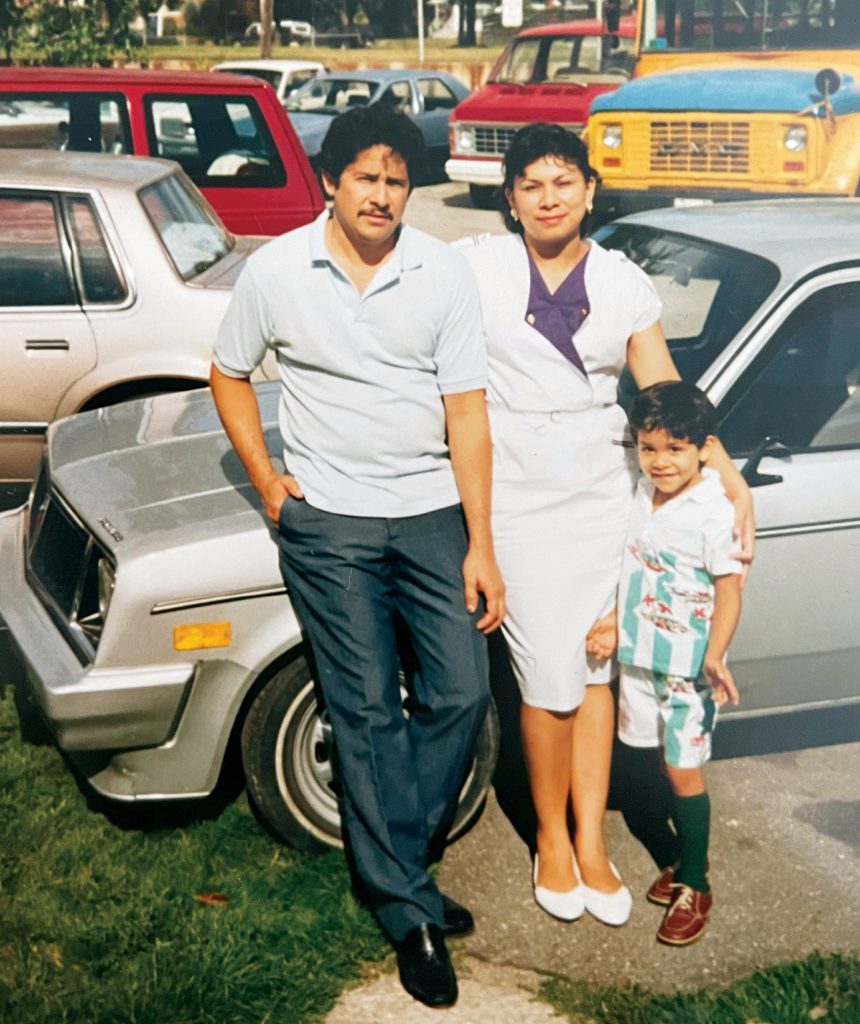
Jarquin was born in Boaco, Nicaragua, but he barely has any memory of the small city, as he came to Canada as a refugee before he was four, travelling with his mother. “We paid to come over illegally, seeking asylum,” Jarquin says. “Somehow we made it to Niagara Falls. My mom, Maria, was in her 20s. She doesn’t talk about it much – it was quite traumatizing for her.” Her husband had come ahead a year earlier, to get set up, flying to Toronto but knowing nothing about where he was going, with one piece of luggage. “He met a pastor on the flight who was willing to help him,” Jarquin says. “He slept at the airport his first night in Canada.” The next day he made his way to Kitchener, Ont. A year later, the unrest in Nicaragua had made air travel impossible, so Jarquin and his mother travelled by land. He lived with his parents in Kitchener until he was 17.
His parents were Catholic, but Jarquin doesn’t recall them being outwardly religious until they got to Canada. “The pastor my father met was a Pentecostal minister, and my parents became quite devoted to the evangelical church,” says Jarquin. “For many years, church was our entire life. We attended five days a week, for four or five hours at a time. My father, José, became a co-pastor. I was part of the choir, and I was a youth leader.”
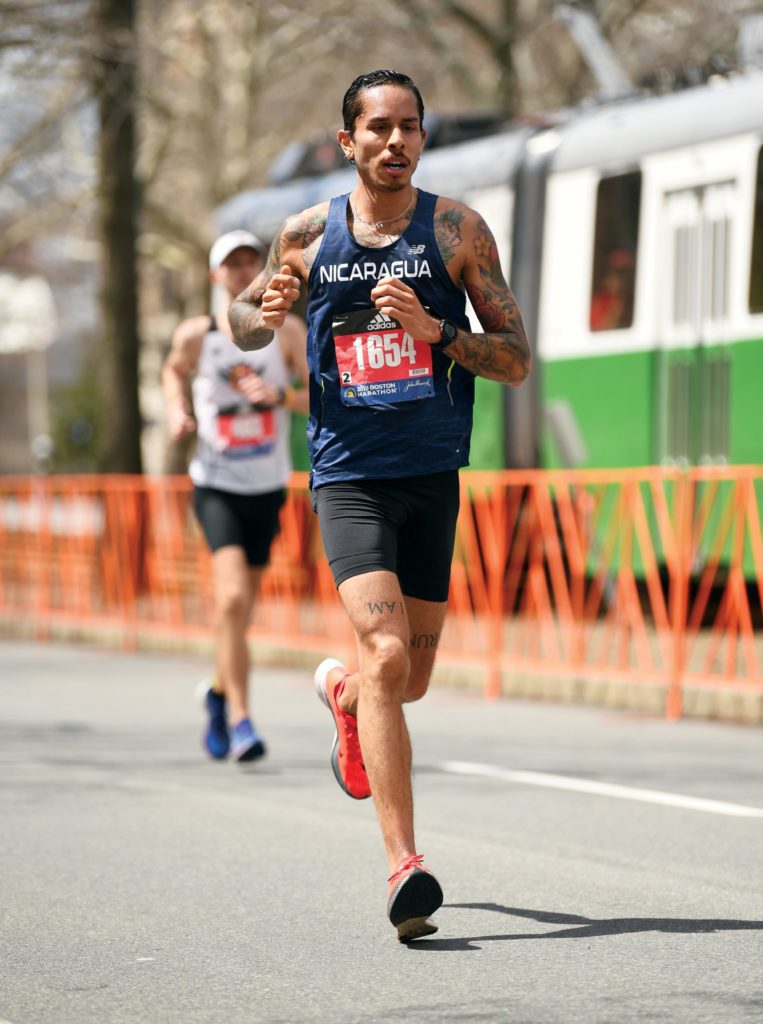
But despite the church’s dominant role in his childhood, Jarquin never quite felt like he fit in. “I was very sheltered,” he says, “because, for evangelicals, most things are a sin.” He did, however, fit in at track practice. When he left home at 17 to attend the University of Toronto, one of the first things he did was join the varsity cross-country and track team. True to his high school experience, he felt comfortable. “I was running really well – actually, I remember that the senior guys were a little upset that the new kid was really good. But, the people on the track team were so welcoming – being gay didn’t matter. No one cared. I didn’t have to explain anything. I was just Gabriel, who ran fast, and that was enough.”
Upon moving to the city, Jarquin knew he wanted to shed some of his past. While growing up, his name was José, but he decided to start introducing himself as Gabriel (his middle name). He also came to accept his sexuality, and after a successful first season with the Varsity Blues, he also started partying. “In second year I went to clubs, and drank for the first time,” he says. “I stopped running and began to party more. I’d been running since grade school, but I stopped, because I couldn’t be at the club four days a week and then at practice on Monday.”
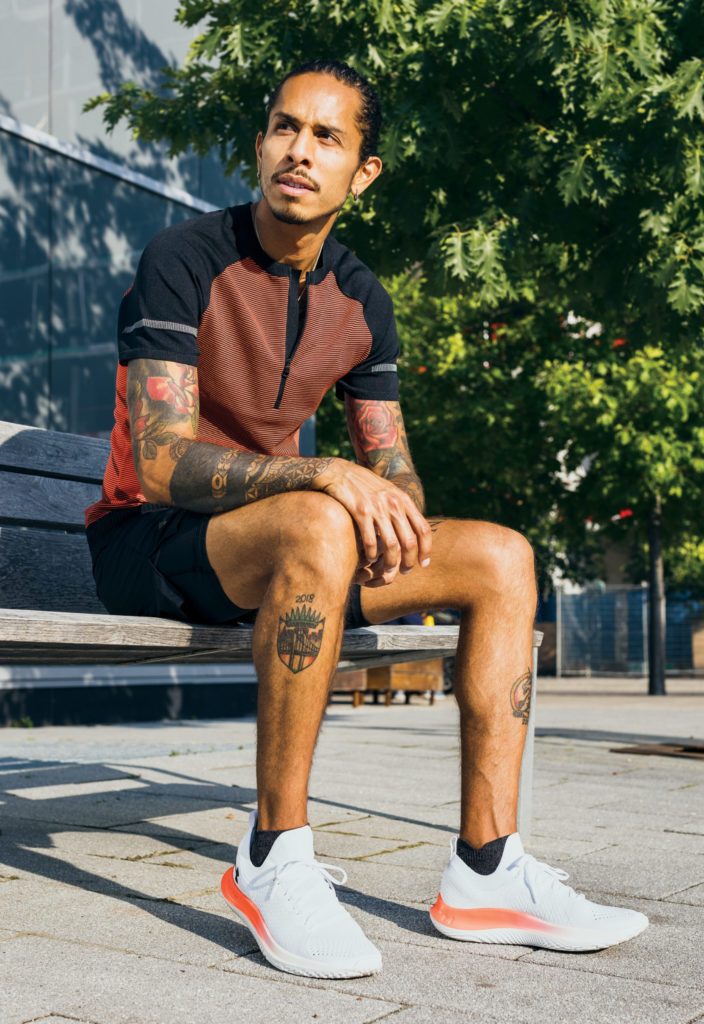
His university partying turned into a lifestyle, and he was becoming increasingly aware that he had a problem: “At the time, I thought I was having fun, but deep down I knew I wasn’t. There was an unhappiness that I was trying to deal with through a very big social schedule.” By his late 20s, Jarquin was dealing with an addiction to crystal meth. Around this time, he also learned that he was HIV-positive.
He describes this time of his life as reaching rock bottom. “The diagnosis didn’t come as a surprise, because I was playing with fire,” he says. “In retrospect, I was being reckless. I didn’t care about myself. I felt unwanted and unloved. The decisions I was making showed that.”
Today, Jarquin manages his HIV with daily medication and a commitment to a healthy lifestyle, something that running at his level makes necessary anyway: “Physically, HIV has never affected me – even when I was diagnosed, I didn’t have symptoms. Being asymptomatic allowed me to ignore it for a long time, but now I want to talk about it. I want other HIV-positive people to know it doesn’t have to slow you down. In fact, I keep getting faster.”
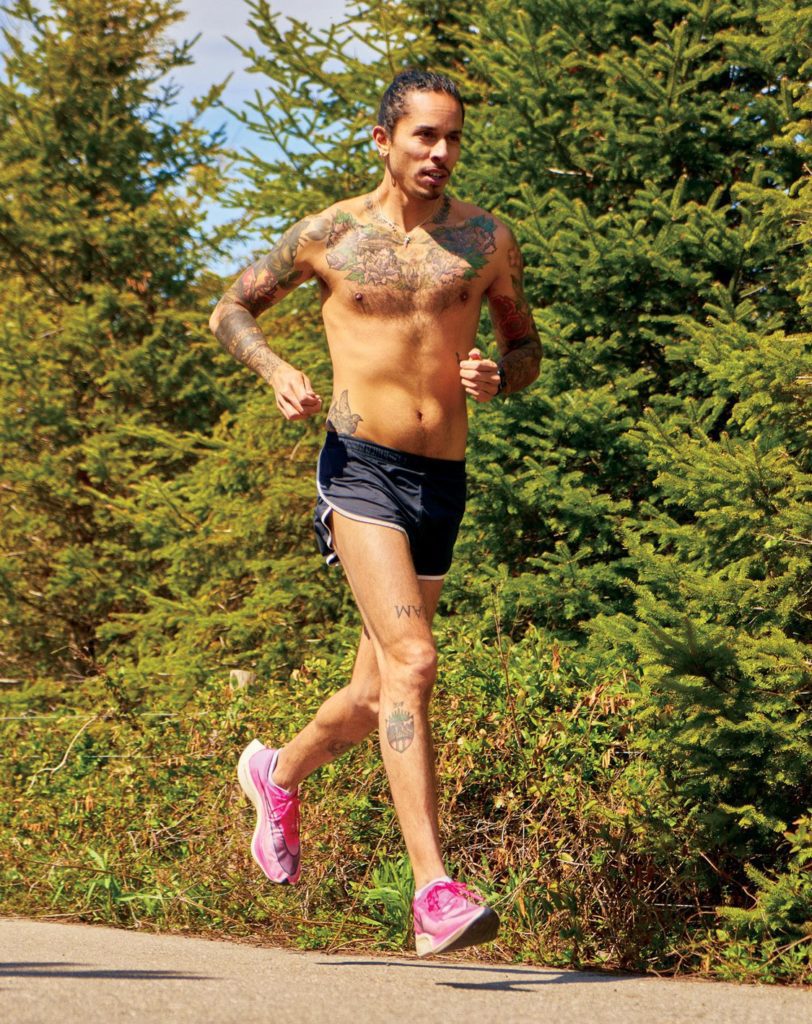
It took a few years, but he managed to get his life back on track, largely by returning to running. The catalyst was a friend inviting him to run the Scotiabank Toronto Waterfront Half Marathon in 2015. “I ‘trained’ for a month,” Jarquin says, using air quotes. “I was hooked.” He joined BlackToe Running, a downtown Toronto store-based running club just a few steps from his home. Over time, with the help of a therapist and his renewed love of running, Jarquin came to care for himself again. “Surrounding myself with the running community again has been such a blessing, and was part of the turning point that brought me back,” he says. “The one thing I love to do is the thing that saved me. As a runner, I’ve never felt like I wasn’t enough.”
One of the runners he met there also encouraged him to return to church. “At the time, I didn’t really feel like church was a place for me,” says Jarquin, “but Sunday came around, and I went with my new friend. It was completely the opposite message from the one I grew up with.”
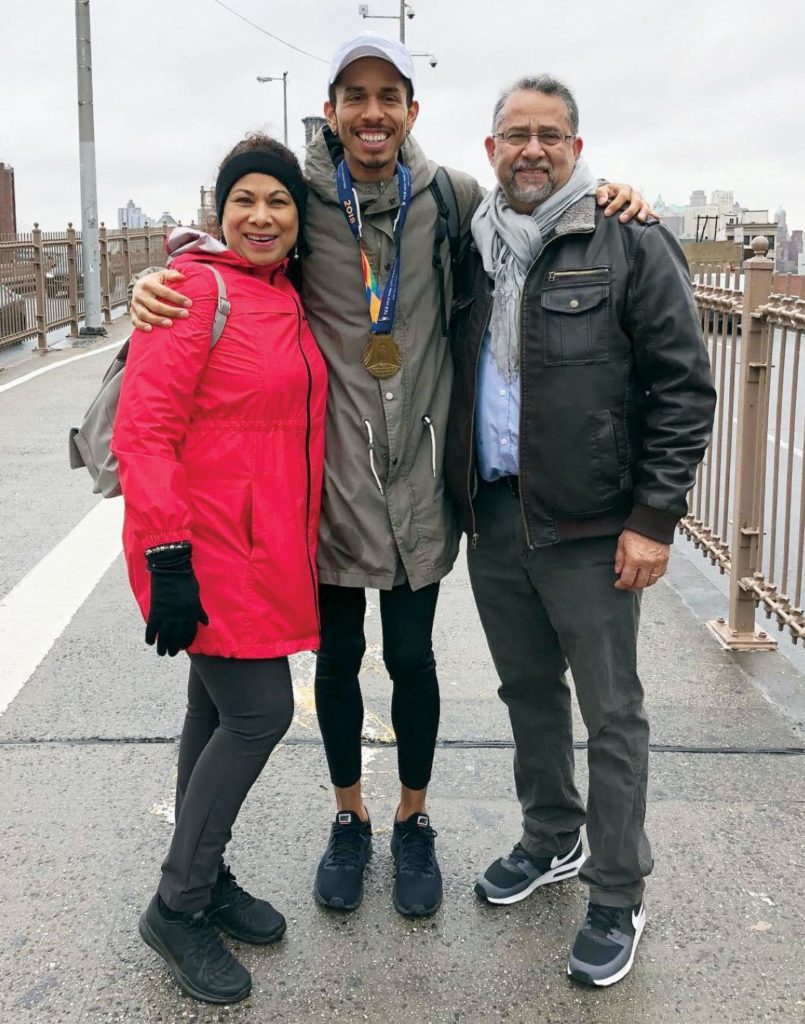
Most significantly, this church had a more liberal approach to sexuality. “I found queer people talking about Jesus,” Jarquin says.
Jarquin’s return to running brought strong results and boosted his confidence. He ran his half-marathon personal best at the Houston Marathon in January 2020, which was also one of his most memorable running experiences. “Before this race,” he says, “I was having a hard time hitting paces in workouts, as I was coming back from an injury. I wasn’t able to complete workouts how I wanted to, and running wasn’t fun any more.” Instead of forcing paces and obsessing over splits, Jarquin started leaving his watch at home and running by feel. “I would use the rhythm of my breath for an indication of how fast I was running,” he says. “All I did differently was listen to my body.” His time in Houston was 1:10:14, running without a watch. “I was running with my heart and giving it everything I could,” he says. “To this day, I still work out without looking at my watch.”
Jarquin has made it his mission to give the running community as much as it has given him. He wants to become what he calls a “love advocate.” “I somehow became the official spokesperson for the Pride and Remembrance Run, and I’ve been able to just be myself, while also representing other people whose experiences align with mine,” he says. “I want to help people realize their self-worth through running.” And not only is his desire genuine, but it yielded real results: despite the race going virtual this year (after last year’s pandemic-related cancellation), Jarquin was able to marshal his friends and followers to create excitement. In the first week of registration, 1,000 people signed up – 50 per cent of the target – and it eventually sold out. “Gabriel has done an excellent job, and because this was a new position on our board, there was no template,” says board president Chris Brohman. Jarquin also gets credit for developing the race’s ambassador program, which generated a lot of buzz – especially important in a year when the organization couldn’t hold the in-person clinics that would normally take place in the lead-up to the race.
His comfort and success in the role speaks to his new-found comfort with himself, which, in turn, benefits his running. Jarquin says he runs best when he’s centred and present. “I shared my story because it felt right,” says Jarquin. “With this, I hope to open other people’s hearts and give them the courage to be brave and to be themselves. We all have struggles, and even though we all have different stories, there are always similarities. I want to show myself, so that others can show themselves, too.”
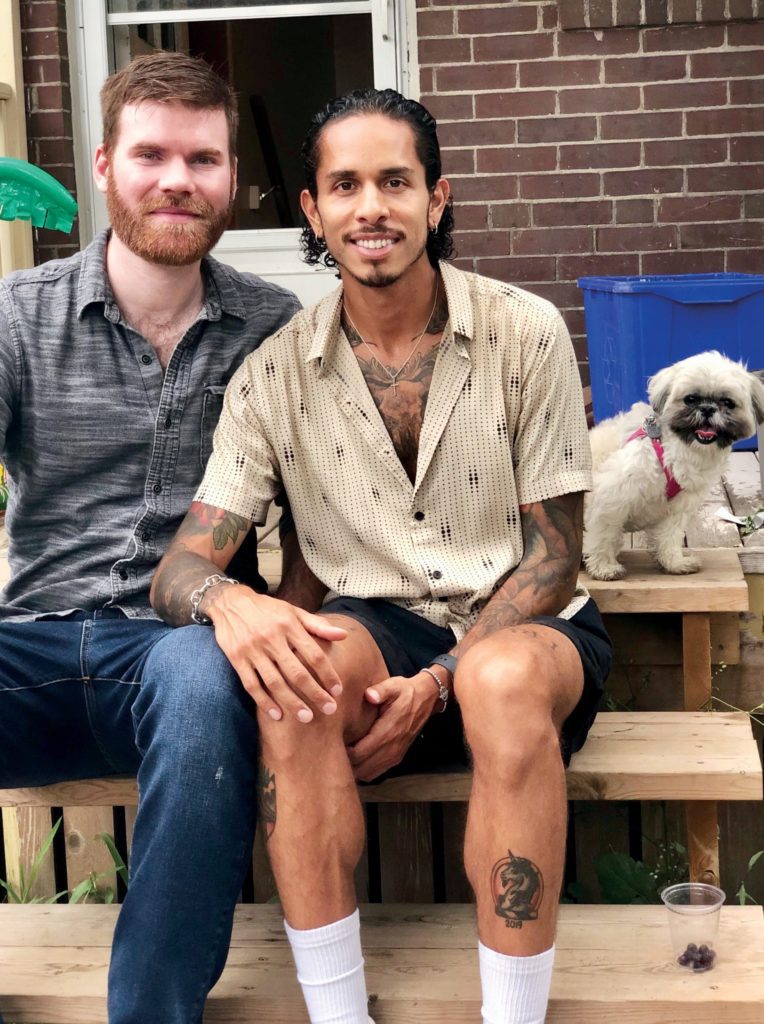
We selected Gabriel Jarquin to be featured in the Under Armour Diversity Series because of his dedication and commitment to the LGBTQ community, both as a runner and outside of running. UA has pledged $5,000 in merchandise to the club or team of each featured individual’s choice, and Jarquin will be putting this donation to good use for deserving participants in the Pride and Remembrance Run.
To learn more about UA’s commitment to diversity, equity and inclusion, go to about.underarmour.com/community/diversity-equity-inclusion.
This story originally appeared in the September/October 2021 issue of Canadian Running Magazine
Madeleine Kelly, who lives in Hamilton, Ont., was the 2019 Canadian 800m champion. In July she was selected to represent Canada at the 2021 Olympics in Tokyo. This was her first national team and her first Olympics.


